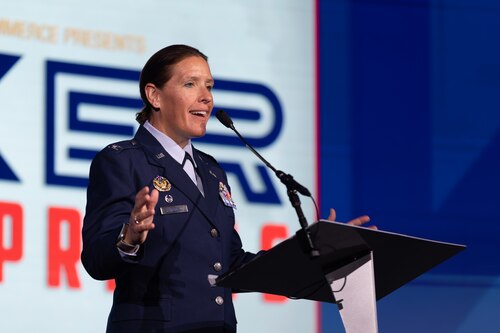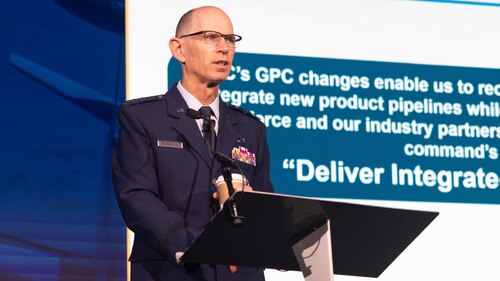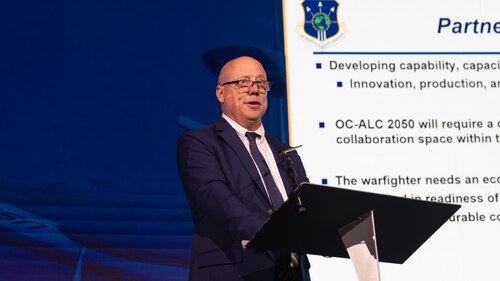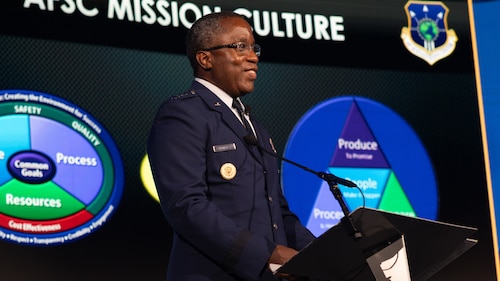The Tinker and the Primes Symposium returned to the Reed Conference Center in Midwest City Aug. 6-8, marking its 18th year of connecting government with industry and academia.
More than 1,300 attended the symposium that was host to some 80 exhibitors. Speakers at the event were greeted by a standing-room-only audience. This year's theme was "Forging Readiness and Accelerating Innovation for Great Power Competition," referring to the shift from post 9/11 conflicts and demands to deterring, and if necessary, winning, conflicts against peer competitors.
Day one of the symposium was headlined by the Honorable Andrew Hunter, assistant secretary of the Air Force for acquisition, technology and logistics. He stressed the importance of partnerships, both between industry and government but also between the various levels of government.
"We need a higher degree of integration, a higher degree of ability to generate scale, and speed in the case of our operations," Hunter said.
He went on to speak about the Air Force Materiel Command's creation of the Integrated Development Office, that will serve as a key partner of acquisition expertise and a liaison to industry.
Later that day, Col. Abby Ruscetta, Tinker Air Force Base and 72nd Air Base Wing commander, spoke about the importance of Tinker AFB in the context of Great Power Competition, emphasizing the need for readiness, innovation and the empowerment of Airmen and their families.
"We are ready, and we are willing, and we are sharpening our sword every single day," Ruscetta said. "We will deter, and we will reassure. This is our reality, and it is the one we are fully prepared to meet head on."
Day two was headlined by the AFMC commander, Gen. Duke Richardson. He discussed in greater detail the new Integrated Development Office as well as other upcoming changes in relation to the Air Force's 24 initiatives to optimize for GPC. These efforts to reorganize and modernize processes seek to improve efficiency, integration and readiness.
"As Secretary [of the Air Force] Kendall says, our task is to ensure we maintain our competitive edge by innovating and strengthening our capabilities across all commands," Richardson said.
Wayde Loflin, Oklahoma City Air Logistics Complex deputy director, spoke about the importance of partnerships between the Air Force, industry and academia to advance aerospace technology and maintain readiness.
"Our true success, particularly our shared success, lies in our partnerships," Loflin said.
He later added, "It's becoming a challenge at OC-ALC to maintain production levels as we develop workarounds due to lack of parts and material. We have partners who are willing to collaborate through information sharing on the gaps in the OEM [original equipment manufacturer] supply and manufacturing base where investment can be mutually beneficial in supporting the warfighter and our organizations. We welcome open discussion with our business offices about not only where we need help, but where we can help fill gaps across the industry. We must have an ecosystem of enterprise partners to support the warfighter."
Closing out the symposium on day three was Lt. Gen. Stacey Hawkins, Air Force Sustainment Center commander. He spoke about the standing up of the AFSC Software Directorate and the importance of all AFSC teammates embodying the "Art of the Possible" mission culture to succeed in GPC.
"Today, every time you turn on the news, you see deterrence, competition and war fighting happening simultaneously around the world," Hawkins said. "Our time is now, and we have to be ready. AFSC capabilities are more critical than ever to defend our great nation."
Tinker and the Primes is a production of the Midwest City Chamber of Commerce in collaboration with Tinker AFB and multiple industry partners.










